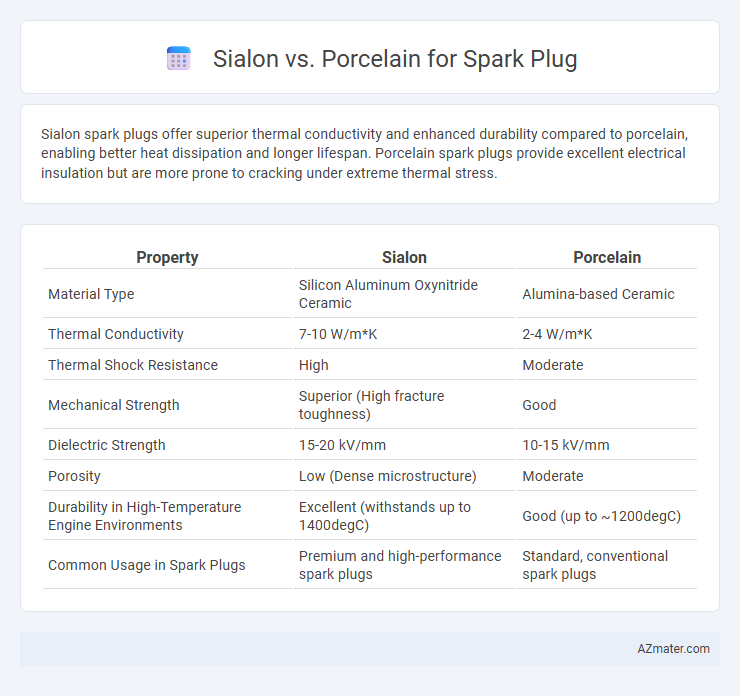Sialon spark plugs offer superior thermal conductivity and enhanced durability compared to porcelain, enabling better heat dissipation and longer lifespan. Porcelain spark plugs provide excellent electrical insulation but are more prone to cracking under extreme thermal stress.
Table of Comparison
| Property | Sialon | Porcelain |
|---|---|---|
| Material Type | Silicon Aluminum Oxynitride Ceramic | Alumina-based Ceramic |
| Thermal Conductivity | 7-10 W/m*K | 2-4 W/m*K |
| Thermal Shock Resistance | High | Moderate |
| Mechanical Strength | Superior (High fracture toughness) | Good |
| Dielectric Strength | 15-20 kV/mm | 10-15 kV/mm |
| Porosity | Low (Dense microstructure) | Moderate |
| Durability in High-Temperature Engine Environments | Excellent (withstands up to 1400degC) | Good (up to ~1200degC) |
| Common Usage in Spark Plugs | Premium and high-performance spark plugs | Standard, conventional spark plugs |
Introduction to Spark Plug Materials
Spark plug materials significantly influence ignition performance and durability, with Sialon and porcelain being prominent choices. Sialon, a silicon aluminum oxynitride ceramic, offers exceptional thermal shock resistance and longevity due to its high strength and toughness. Porcelain, traditionally used for insulation, provides reliable electrical insulation but is more prone to cracking under extreme thermal stress compared to Sialon.
Overview of Sialon Ceramics
Sialon ceramics, a composite of silicon, aluminum, oxygen, and nitrogen, exhibit superior thermal stability, wear resistance, and mechanical strength compared to traditional porcelain materials used in spark plugs. These properties enable Sialon spark plugs to withstand higher combustion temperatures and reduce electrode erosion, enhancing ignition performance and engine efficiency. The advanced microstructure of Sialon ceramics also contributes to longer service life and improved durability in harsh automotive environments.
Properties of Porcelain in Spark Plugs
Porcelain in spark plugs is valued for its exceptional insulating properties, high dielectric strength, and resistance to electrical breakdown, offering reliable performance under extreme combustion temperatures. Its thermal conductivity helps dissipate heat efficiently, preventing overheating and maintaining stable spark timing. Porcelain's mechanical durability and resistance to chemical corrosion ensure longevity and consistent ignition capability in harsh engine environments.
Thermal Conductivity Comparison
Sialon spark plugs exhibit superior thermal conductivity compared to porcelain, enhancing heat dissipation and improving engine efficiency. The advanced ceramic composition of Sialon allows it to withstand higher operating temperatures while maintaining structural integrity. Porcelain, while durable, has lower thermal conductivity, leading to less effective heat management in high-performance engines.
Mechanical Strength and Durability
Sialon spark plugs exhibit superior mechanical strength due to their advanced silicon aluminum oxynitride composition, which offers enhanced resistance to thermal shock and mechanical stress compared to traditional porcelain. Porcelain spark plugs, while cost-effective, tend to have lower fracture toughness and can degrade faster under high-temperature cycling typical in engines. Sialon's improved durability directly translates to longer service life and increased reliability in demanding automotive applications.
Electrical Insulation Performance
Sialon spark plugs exhibit superior electrical insulation performance compared to porcelain due to their higher dielectric strength and thermal stability, reducing the risk of flashover under high voltage conditions. Sialon's advanced ceramic composition enables better resistance to thermal and mechanical stresses, ensuring consistent spark delivery and improved ignition reliability. Porcelain insulators, while traditionally used, may degrade faster under extreme engine temperatures, potentially compromising insulation integrity over time.
Resistance to Thermal Shock
Sialon spark plugs exhibit superior resistance to thermal shock due to their enhanced mechanical strength and low thermal expansion, making them ideal for high-performance and extreme temperature applications. Porcelain spark plugs, while durable, tend to have higher thermal expansion and are more prone to cracking or failure under rapid temperature changes. The exceptional thermal shock resistance of Sialon materials significantly improves spark plug longevity and reliability in demanding engine conditions.
Cost and Manufacturing Differences
Sialon spark plugs exhibit higher manufacturing costs due to advanced silicon nitride-based ceramics and complex fabrication processes compared to the more traditional porcelain plugs made from alumina ceramics. Porcelain spark plugs benefit from lower production expenses, leveraging well-established, cost-efficient kiln firing techniques. While Sialon offers superior thermal conductivity and durability, its premium materials and intricate manufacturing contribute to a significantly increased cost relative to standard porcelain spark plug insulators.
Application Suitability: Sialon vs Porcelain
Sialon spark plug insulators offer superior thermal conductivity and mechanical strength, making them ideal for high-performance engines and extreme operating conditions. Porcelain insulators provide reliable performance for standard automotive and general-purpose applications due to their cost-effectiveness and adequate insulation properties. The choice between Sialon and Porcelain depends on the engine's thermal demands and durability requirements, with Sialon favored for high-temperature, high-stress environments.
Conclusion: Choosing the Right Material for Spark Plugs
Sialon spark plugs offer superior thermal conductivity and durability, making them ideal for high-performance engines requiring consistent ignition under extreme conditions. Porcelain spark plugs provide excellent insulation and cost-effectiveness, suitable for standard vehicles with regular operating demands. Selecting the right material depends on engine type and performance needs, where Sialon fits advanced applications and porcelain serves conventional use efficiently.

Infographic: Sialon vs Porcelain for Spark plug
 azmater.com
azmater.com